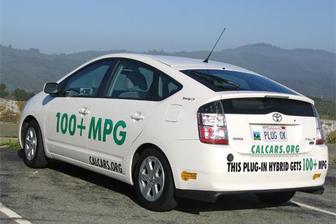
This is my 20th and last blog entry of 2006 after a late start to fairly serious blogging a couple of months ago. As the year draws to a close there is a tremendous feeling of a world of accomplishment in car energy innovation and yet an equally powerful sense of the amount of work that needs to be done. No doubt, the world has taken to the pursuit and there is no looking back. The future is intriguing and bright. If there is one element that promises to be on most watch lists its the burgeoning buzz of ultra capacitors. A technology that seeks to improve the power of Nickel Metal Hydride batteries (most utilized in today's electric hybrids) many fold while reducing charge time.
As I take account of the task ahead I need to look no further than myself. When I launched myself into measure and action, I started to track my miles and gas consumption. After a measly 8 trips to review (i know that's not nearly anything) I still got a sense of the level of consumption that I find myself anchored in and the truism that lies there in when people call it a 'gas guzzling' habit. Anyone who has been benevolent enough to discover some of what americasmpg.com is about would know that we have propagated the measure of actual gas consumption along with MPG as an anchor to the responsibility of efficiency.
As I take account of the task ahead I need to look no further than myself. When I launched myself into measure and action, I started to track my miles and gas consumption. After a measly 8 trips to review (i know that's not nearly anything) I still got a sense of the level of consumption that I find myself anchored in and the truism that lies there in when people call it a 'gas guzzling' habit. Anyone who has been benevolent enough to discover some of what americasmpg.com is about would know that we have propagated the measure of actual gas consumption along with MPG as an anchor to the responsibility of efficiency.
In 2006, my worst trip showed that I devoured 4.7 gallons of gas per day and the best one was 0.94 gallons per day. I'm glad I ended the year with an overall average below 3 gallons a day. But, to think of it. Consuming 2.85 gallons every day. $7.60 per day. $2,800 for the year. And that's off just one car. I suspect this to be higher than the national average as it comes from a city with a token structure and no culture of public transportation. However, with great problems come great opportunities. And if consumption drops 0.5 gallons per day then that's an incentive of $500 a year right there. Or one car payment plus insurance for most of us. I think 2.35 gallons per car per day would be a good target for me in 2007. On the MPG side, guess what (I had no idea this would happen), but my worst trip in terms of consumption or GSD (Gallons Spend Daily) turned out to be the best in MPG. Not surprising at all. A few hours on the freeway and that's all it takes. The best trip in GSD turned out to be the worst in MPG. Now, that was surprising. Doesn't have to be that way. Just a co-incidence. I must have known that I was sooooo kicking butt in GSD that I started flooring the gas pedal off stops whenever I could. And why not? I deserved it! This does not mean that MPG is defunct as a measure. MPG is how the carmaker works on efficiency. GSD is how the driver does. And while GSD will have limits - one can pretty much exhaust efficiency enhancement after several trips - MPG efficiency will continue to grow with new technology in exciting ways.
After some feedback from friends and one or two of you I have worked some enhancements into the tracking which will now capture a 3 month rolling average and an overall average of how many gallons are being consumed every day (the GSD). Here are links to the page on regiments as well as the tracking sheet and my own sheet:
Regiments page
My tracking spreadsheet
After some feedback from friends and one or two of you I have worked some enhancements into the tracking which will now capture a 3 month rolling average and an overall average of how many gallons are being consumed every day (the GSD). Here are links to the page on regiments as well as the tracking sheet and my own sheet:
Regiments page
My tracking spreadsheet
Oh, I also added a provision for if you decide to change cars you can just note the new car and on which trip the tracking switches over to the new car.
A very very happy, prosperous and less gaseous new year to you ALL !!! I know I need it.



















